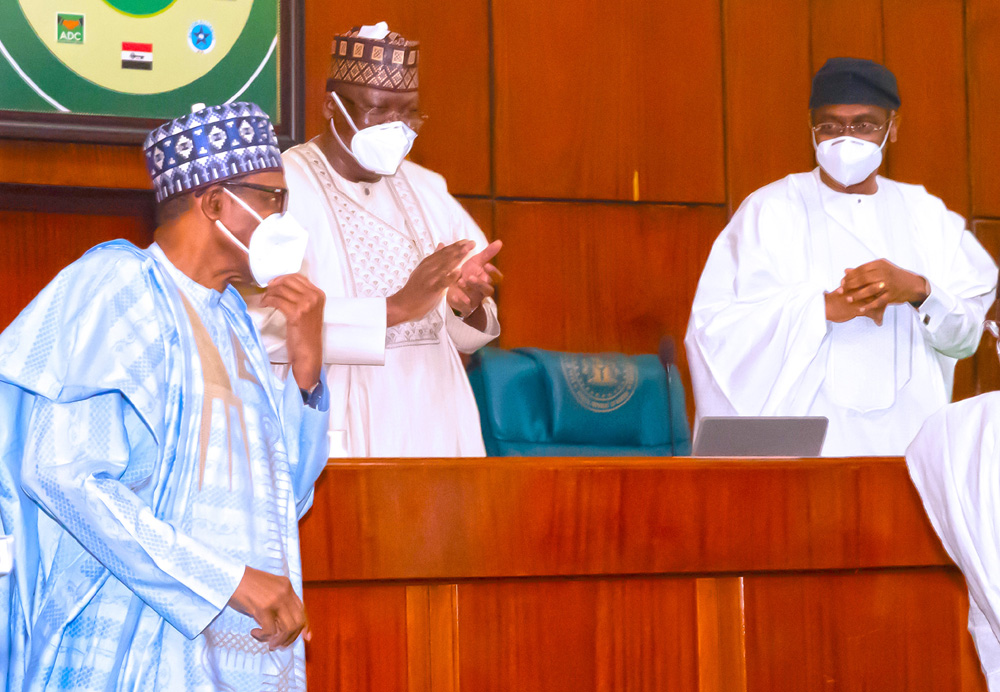Charles Abuede
 Nigeria’s President Muhammadu Buhari, on Thursday, appeared before the joint session of the National Assembly for the presentation of the proposed 2021 national budget of N13.08 trillion. The proposed budget, which is titled, “Economic Recovery and Resilience”, is aimed at promoting economic diversity as well as enhancing social inclusion.
At the presentation before the lawmakers on Thursday in Abuja, the president highlighted that the proposed budget consists of N5.65 trillion as non-debt recurrent expenditure, N3.76 trillion for personnel cost and N3.124 trillion for debt service. Consequently, the sum of N501.19 billion was set aside as pensions, gratuities and retirees’ benefits; overheads in the sum of N625.50 billion and a sinking fund of N220 billion to retire certain maturing bonds.
Furthermore, the N13.08 trillion also includes N1.35 trillion in expenditure by 60 government-owned enterprises as well as Grants and Aid funded spending of N354.85 billion.
STATUTORY TRANSFERS
On the statutory transfers, President Muhammadu Buhari said the sum of N484.49 billion has been provided in 2021 budget. This amount is an increase of N56.46 billion or 13 per cent over the 2020 revised budget. The provisions include:
Nigeria’s President Muhammadu Buhari, on Thursday, appeared before the joint session of the National Assembly for the presentation of the proposed 2021 national budget of N13.08 trillion. The proposed budget, which is titled, “Economic Recovery and Resilience”, is aimed at promoting economic diversity as well as enhancing social inclusion.
At the presentation before the lawmakers on Thursday in Abuja, the president highlighted that the proposed budget consists of N5.65 trillion as non-debt recurrent expenditure, N3.76 trillion for personnel cost and N3.124 trillion for debt service. Consequently, the sum of N501.19 billion was set aside as pensions, gratuities and retirees’ benefits; overheads in the sum of N625.50 billion and a sinking fund of N220 billion to retire certain maturing bonds.
Furthermore, the N13.08 trillion also includes N1.35 trillion in expenditure by 60 government-owned enterprises as well as Grants and Aid funded spending of N354.85 billion.
STATUTORY TRANSFERS
On the statutory transfers, President Muhammadu Buhari said the sum of N484.49 billion has been provided in 2021 budget. This amount is an increase of N56.46 billion or 13 per cent over the 2020 revised budget. The provisions include:
- Nigeria President Buhari presents N13.08trn national budget for 2021
- Capital expenditure aggregated at N3.85trn
- While non-debt recurrent expenditure stands at N5.65 trn
 Nigeria’s President Muhammadu Buhari, on Thursday, appeared before the joint session of the National Assembly for the presentation of the proposed 2021 national budget of N13.08 trillion. The proposed budget, which is titled, “Economic Recovery and Resilience”, is aimed at promoting economic diversity as well as enhancing social inclusion.
At the presentation before the lawmakers on Thursday in Abuja, the president highlighted that the proposed budget consists of N5.65 trillion as non-debt recurrent expenditure, N3.76 trillion for personnel cost and N3.124 trillion for debt service. Consequently, the sum of N501.19 billion was set aside as pensions, gratuities and retirees’ benefits; overheads in the sum of N625.50 billion and a sinking fund of N220 billion to retire certain maturing bonds.
Furthermore, the N13.08 trillion also includes N1.35 trillion in expenditure by 60 government-owned enterprises as well as Grants and Aid funded spending of N354.85 billion.
STATUTORY TRANSFERS
On the statutory transfers, President Muhammadu Buhari said the sum of N484.49 billion has been provided in 2021 budget. This amount is an increase of N56.46 billion or 13 per cent over the 2020 revised budget. The provisions include:
Nigeria’s President Muhammadu Buhari, on Thursday, appeared before the joint session of the National Assembly for the presentation of the proposed 2021 national budget of N13.08 trillion. The proposed budget, which is titled, “Economic Recovery and Resilience”, is aimed at promoting economic diversity as well as enhancing social inclusion.
At the presentation before the lawmakers on Thursday in Abuja, the president highlighted that the proposed budget consists of N5.65 trillion as non-debt recurrent expenditure, N3.76 trillion for personnel cost and N3.124 trillion for debt service. Consequently, the sum of N501.19 billion was set aside as pensions, gratuities and retirees’ benefits; overheads in the sum of N625.50 billion and a sinking fund of N220 billion to retire certain maturing bonds.
Furthermore, the N13.08 trillion also includes N1.35 trillion in expenditure by 60 government-owned enterprises as well as Grants and Aid funded spending of N354.85 billion.
STATUTORY TRANSFERS
On the statutory transfers, President Muhammadu Buhari said the sum of N484.49 billion has been provided in 2021 budget. This amount is an increase of N56.46 billion or 13 per cent over the 2020 revised budget. The provisions include:
- N29.7 billion for the Nigerian National Petroleum Corporation;
- N63.5 billion for the Niger Delta Development Commission;
- N110 billion for the Nigerian Judicial Council;
- N128 billion for the National Assembly;
- N40 billion for the Independent National Electoral Commission;
- N5.2 billion for the Public Complaints Commission;
- N35.03 billion for Basic Health;
- N3 billion for the National Human Rights Commission;
- N20 billion for the Social Housing Programmes;
- N70.05 billion for Universal Basic Education Commission; and
- N420 billion for the Social Investment Programmes
- The sum of N227.02 billion has been provided for the Ministry of Interior;
- N441.39 billion for the Ministry of Police affairs;
- N545.10 billion for the Ministry of Education
- N840.56 billion for Ministry of Defence; and
- N380.21 billion for the Ministry of Health
- N198 billion for Power; this includes the N150 billion for the Power Sector Recovery plan;
- N404 billion for Works and Housing
- N256 billion for Transportation
- N121 billion for Defence
- N110 billion for Agriculture and Rural Development
- N153 billion for Water Resources
- N51 billion for Industry, Trade and Investment
- N127 billion for Education
- N70 billion for Universal Basic Education Commission
- N132 billion for Health
- N100 for zonal intervention projects and
- N64 billion for the Niger Delta Development Commission